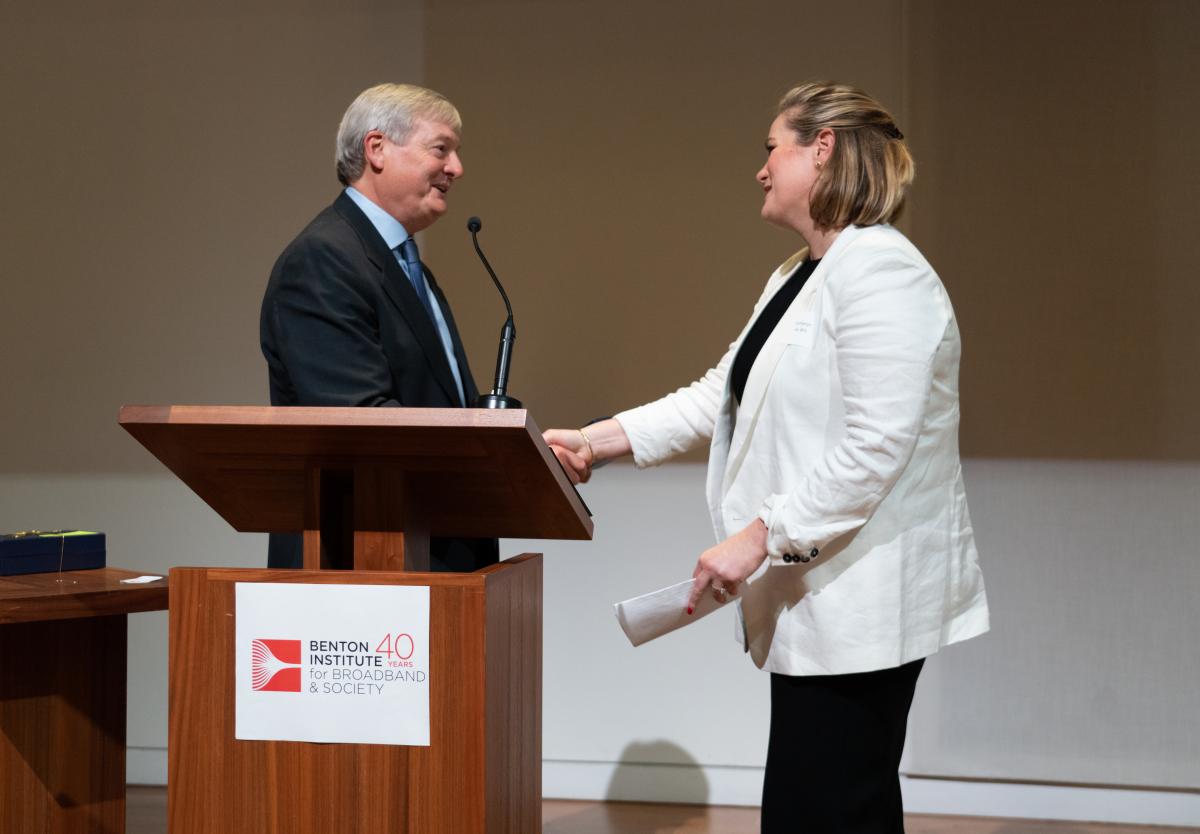Make Room at the Table
Monday, April 25, 2022
Digital Beat
Make Room at the Table

I had the distinct pleasure of honoring Kathryn de Wit with the Benton Institute's Emerging Leader Award at our 40th Anniversary Celebration on April 6, 2022.
As the work of connecting everyone through broadband moves from the federal to the state level, the Pew Charitable Trusts’ Broadband Access Initiative has now emerged as one of the central catalysts accelerating promising state efforts. Pew has been partnering with state governments for years to implement evidence-based solutions but is now taking it to a whole new level to deliver even more broadband progress thanks to the foresight and leadership of Kathryn de Wit.
Kathryn leads a cross-functional team of researchers, communications experts, and government affairs professionals who identify and bridge research gaps and build models key to solving the digital divide. Her bold broadband vision means more states will be better prepared to seize this moment, to ensure everyone has access to affordable, robust broadband service.
Kathryn has been with Pew since 2018, but her expertise goes back to the American Recovery and Reinvestment Act broadband grants—drawing the vital link between broadband buildout and its impact on the way we work, the way we learn, and the way we grow local economies.
She was a key player on President Biden’s transition team. And anyone who has had the chance to work with Kathryn, as I've been fortunate to, understands she’s not just a smart and perceptive leader for today, but will be one of the greats of tomorrow.

Here I share an excerpt of Kathryn's remarks to give you a sense of her perspective on meeting one of the greatest challenges of our time: universal broadband.
First and foremost, I’d like to say thank you to the Benton team and the Board for this award. It’s an honor to be recognized in this way and I’m deeply touched. It truly means more than I can say.
My parents weren’t able to join us today, but they are, simply, two of the kindest and most diligent people I know. My work ethic, drive, and focus on doing things just a little bit better, comes directly from them.
They worked hard to give their daughters a good, stable life and set us on a path to success. Their sacrifices afforded us the privilege of making professional choices largely driven by interest or purpose—despite sometimes wondering how we were going to make rent. In return, they expected us to be generally competent and self-sufficient humans who would contribute to society.
John and Sandy McCaffrey also raised us with a core set of values and rules. For the purposes of this group, I’ll skip “there’s no crying in baseball” and move along to the following: First, find solutions to the problems that matter.
Second: no matter where you go, make room for other people at the table.
Those problems and tables don’t always need to be big—sometimes it’s inviting the new kid to sit with you at lunch or making sure everyone gets a Valentine on Valentine’s Day.
Sometimes it’s being part of the group of advocates that secured the largest single federal investment in broadband.
The point is that neither of those rules is sufficient without the other. I think that’s why I enjoy working in this field of broadband and digital equity. It’s hard. It takes thought, precision, and fortitude. But it’s the thing that matters.
Because it is so hard and complex, it also requires a genuine desire to solve problems—not to mention humility—and a willingness to make space for others to join the conversation. Especially now. And that’s how all of you operate, which is why I’m deeply honored to be counted as part of this community.
When I started working on broadband about a decade ago, the first order of business was signing up for Benton's daily Headlines newsletter. I credit that publication for shaping my understanding of the field and the issues that mold it. When I began my job at Pew four years ago, the idea of a major infrastructure bill—let alone funds for two in the same year—was laughable. For fiber and digital equity? Administered by states? You’re joking. But hey, here we are. Working on the solutions that matter.
I hope that somewhere, another young policy researcher is reading Benton’s newsletter, learning from the work of my team and others, and getting ready to help us solve the biggest problems that matter. And I can’t wait to work with them and all of you, because there is plenty of space at the table.
Thank you again.
On April 6, we were fortunate to have with us so many leaders who have been instrumental in shaping our communications history and getting us to where we are today. But as we raise our sights, and look to the future, a new generation of savvy leaders is already stepping up to make a huge impact in service to our cause. Kathryn de Wit is a leader we can all look up to and learn from.
Jim Kohlenberger is a member of the Benton Institute's board of directors. He is president of JK Strategies, an innovation policy-focused consulting practice. Previously, Jim was Chief of Staff of the White House Office of Science and Technology Policy in the Obama Administration (2009-2011). Prior to that, Jim was a Senior Policy Fellow at Benton (2004-2008). Jim also served as the Senior Domestic Policy Advisor in the Clinton White House (1993-2000).
The Benton Institute for Broadband & Society is a non-profit organization dedicated to ensuring that all people in the U.S. have access to competitive, High-Performance Broadband regardless of where they live or who they are. We believe communication policy - rooted in the values of access, equity, and diversity - has the power to deliver new opportunities and strengthen communities.
© Benton Institute for Broadband & Society 2022. Redistribution of this email publication - both internally and externally - is encouraged if it includes this copyright statement.
For subscribe/unsubscribe info, please email headlinesATbentonDOTorg






